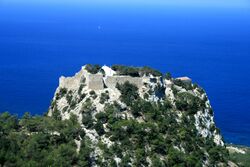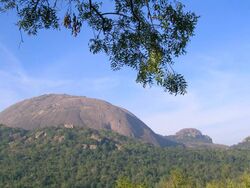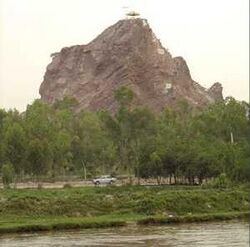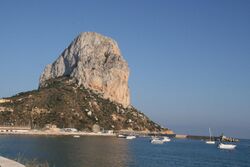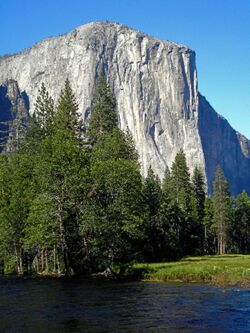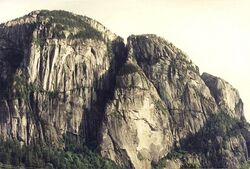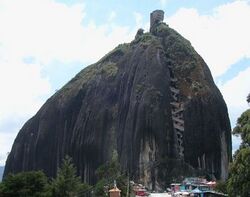Earth:Monolith
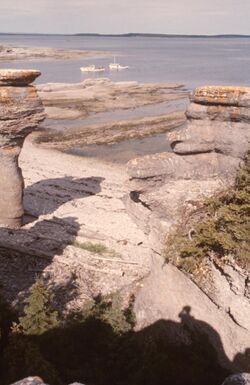
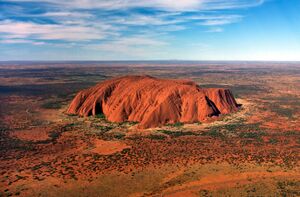
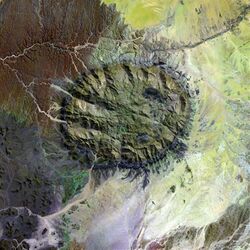
A monolith is a geological feature consisting of a single massive stone or rock, such as some mountains. Erosion usually exposes the geological formations, which are often made of very hard and solid igneous or metamorphic rock. Some monoliths are volcanic plugs, solidified lava filling the vent of an extinct volcano.
In architecture, the term has considerable overlap with megalith, which is normally used for prehistory, and may be used in the contexts of rock-cut architecture that remains attached to solid rock, as in monolithic church, or for exceptionally large stones such as obelisks, statues, monolithic columns or large architraves, that may have been moved a considerable distance after quarrying. It may also be used of large glacial erratics moved by natural forces.
The word derives, via the Latin monolithus, from the Ancient Greek word μονόλιθος (monólithos), from μόνος (mónos) meaning "one" or "single" and λίθος (líthos) meaning "stone".
Geological monoliths
Large, well-known monoliths include:
Africa
- Aso Rock, Nigeria
- Ben Amera, Mauritania
- Brandberg Mountain, Namibia
- Sibebe, Eswatini
- Zuma Rock, Nigeria
- Mount Lubiri, Angola
- Mount Poi, Kenya
- Great Sphinx of Giza
- Oruku Rock, Ososo, Edo State, Nigeria
Antarctica
Asia
- Batu Caves, Selangor, Malaysia[1]
- Ahmedabad, Gujarat, India
- Bellary Fort, Bellary, India
- Bhongir, Telangana, India
- Madhugiri Betta, Karnataka, India
- Kailasa temple, Ellora. Maharashtra, India
- Namakkal Fort Namakkal , Tamilnadu India ,
- Mount Kelam, Indonesia
- Mount Pico de Loro, Philippines
- Mount Pulumbato, Philippines
- Sangla Hill, Pakistan
- Savandurga, Karnataka, India
- Sigiriya, Sri Lanka
- Yana, Karnataka, India
- Gilbert Hill, Mumbai , India
- Rockfort, Trichy, India
- The Tsunami Penile Monument, Malé, Maldives
- Ekasila, Warangal, India [2]
Australia
- Bald Rock, near Tenterfield, New South Wales
- Mount Augustus (Burringurrah), Western Australia (NOTE: this is not actually monolith as popularly claimed, but, rather, a monocline)
- Mount Coolum, Queensland
- Mount Wudinna, South Australia
- Pine Mountain, Victoria
- Uluru, Northern Territory
Europe
- Kalamos, Anafi, Greece
- Katskhi pillar, Georgia
- Levski G., Sofia, Bulgaria
- Logan Rock, Treen, Cornwall, England
- Monolithe de Sardières, Sollières-Sardières, France
- Penyal d'Ifac, Calpe, Valencian Community, Spain
- Peña de Arcos, Arcos de la Frontera, Andalusia, Spain
- Peña de los Enamorados, Antequera, Andalusia, Spain (a World Heritage Site)
- Rock of Gibraltar, Gibraltar
- Rock of Monaco, Monaco-Ville, Monaco
- Rock Cappa, San Luca, Italy
North America
United States
- Angels Landing, Zion National Park, Utah
- Beacon Rock, Columbia River Gorge, Washington
- Bottleneck Peak, Sids Mountain, Utah
- Castle Rock, Pineville, West Virginia
- Chimney Rock, Bayard, Nebraska
- Chimney Rock, Chimney Rock, North Carolina
- Courthouse and Jail Rocks, Bridgeport, Nebraska
- Devils Tower, Wyoming
- El Capitan, Yosemite National Park, California
- Enchanted Rock, Llano County, Texas
- Frog Woman Rock, Mendocino County, California
- Great White Throne, Zion National Park, Utah
- Half Dome, Yosemite National Park, California
- Haystack Rock, Clatsop County, Oregon
- Looking Glass Rock, Transylvania County, North Carolina
- Morro Rock, Morro Bay, California
- Quincy Quarries Reservation, Quincy, Massachusetts
- Scotts Bluff National Monument, Gering, Nebraska
- Shiprock, San Juan County, New Mexico
- Stone Mountain, Stone Mountain, Georgia
- Stone Mountain, Stone Mountain, North Carolina
- Tooth of Time, Cimarron, New Mexico
- Wolf Rock, Linn County, Oregon
Canada
- Stawamus Chief, Squamish, British Columbia
- Mingan Archipelago National Park Reserve, Quebec[3]' [4]' [5]' [6]
Mexico
Las piedrotas near the town of Tapalpa, Jalisco.
South America
- El Peñón, also known as El Peñol Stone or simply La Piedra, Colombia
- Pão de Açúcar, Brazil
- Pedra da Gávea, Brazil the world's largest monolith on the coastline
- Pedra da Galinha Choca, Brazil
- Torres del Paine, Chile
Outside Earth
Monumental monoliths
A structure which has been excavated as a unit from a surrounding matrix or outcropping of rock.[11]
- Aztec calendar stone – "Stone of the Sun"
- The Church of Saint George in Lalibela, Ethiopia, is one of a number of monolithic churches in Ethiopia.
- The vast monoliths which went into the walls of Osaka Castle, Japan.
- Coyolxauhqui Stone another aztec monolith
- Ellora Caves – UNESCO World Heritage Site
- Great Sphinx of Giza – "The Egyptian Sphinx"
- Gommateshwara statue of Bahubali at Sravanabelagola, Carnataca, India
- Obelisks – see this article for a list
- Ogham stones, inscribed standing stones throughout Ireland
- Runestones
- Standing stones
- Stelae
- Stone circle
- Stone of the Pregnant Woman, Baalbek
- The Stonehenge in present-day England
- The Longstones or the Devil's Quoits, Avebury, Wiltshire, England
- Architecture of Vijayanagar in present-day south India
See also
- Earth:Inselberg – Isolated, steep rock hill on relatively flat terrain
- Earth:Butte – Isolated hill with steep, often vertical sides and a small, relatively flat top
- Earth:Kigilyakh – Natural tall rock pillars in Yakutia
- Unsolved:Megalith – Large stone used to build a structure or monument
- Unsolved:Menhir – Large upright standing stone
- Unsolved:Monolithic architecture – Buildings carved or excavated from a single material, usually rock
References
- ↑ Lee (2018-01-31). "A Guide To The Batu Caves, Kuala Lumpur". https://theculturetrip.com/asia/malaysia/articles/a-brief-history-of-the-iconic-batu-caves-in-malaysia/.
- ↑ Siddeshwar (2017-06-03). "Journeys across Karnataka: Ekasila Gutta, Warangal fort". https://karnatakatravel.blogspot.com/2017/06/ekasila-gutta-warangal-fort.html.
- ↑ "Mingan Archipelago National Park Reserve". The Canadian Encyclopedia. 2015-01-03. https://www.thecanadianencyclopedia.ca/en/article/mingan-archipelago-national-park-reserve. "Oddly shaped rock pillars sculpted by wind and sea create the unique islandscape of the natural reserve"
- ↑ "Mingan Archipelago National Park Reserve". Government of Canada. 2022-11-19. https://parks.canada.ca/pn-np/qc/mingan/nature/conservation/protection. "Several animal and plant species present on the islands of the Mingan Archipelago and the surrounding landscape are endangered or at risk"
- ↑ "Mingan Archipelago National Park Reserve". Quebec, Canada: National Geographic. https://www.nationalgeographic.com/travel/article/mingan-archipelago-canada-park. "close to a thousand islands and islets sprinkled along 93 miles from east to west, 24,711 acres"
- ↑ "The Mingan Archipelago,". St Lawrence golf: Canadian Geographic. https://canadiangeographic.ca/articles/the-mingan-archipelago-a-land-shaped-by-time/. "the shoreline at low tide reveals seemingly endless tide pools full of barnacles, green sea urchins, sea stars and other small invertebrates."
- ↑ López Domínguez, Leonor (May 2001). "Villa de Bernal and its Magic Mountain". México Desconocido #291. http://www.mexicodesconocido.com.mx/contenidos/home.html?p=nota&idNota=8897.
- ↑ "Peña de Bernal - Bernal - Queretaro" (in es). http://www.de-paseo.com/Bernal/Bernal.htm.
- ↑ Carrillo, Raul (2007). Northrop, Laura Cava. ed. Let's Go Mexico: On a Budget. Macmillan. p. 370. ISBN 978-0-312-37452-5.
- ↑ Escobar Ledesma, Agustín (1999). Recetario del semidesierto de Querétaro: Acoyos, rejalgares y tantarrias. Conaculta. p. 75. ISBN 978-970-18-3910-2.
- ↑ "Glossary". http://www.art-and-archaeology.com/india/glossary1.html#monolith.
External links
- Regarding Uluru/Ayers Rock and earlier representations of it as the largest monolith: GA.gov.au, ABC.net.au, Wayoutback.com.au
 |
